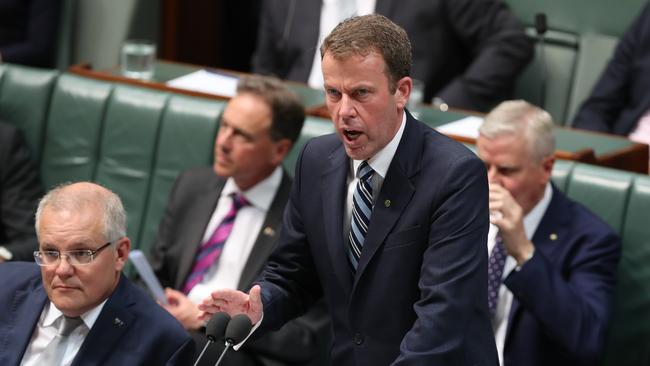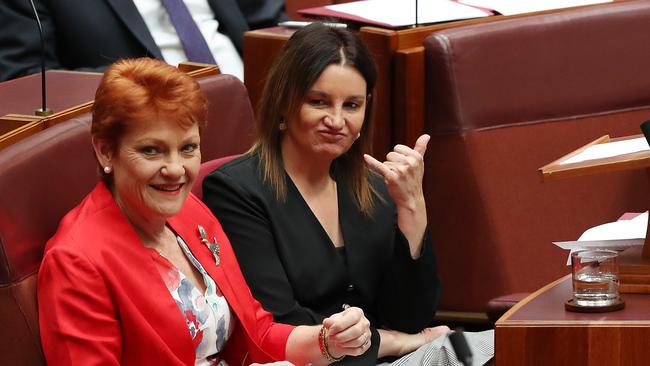Defects in the economy, schools, infrastructure and water call for practical policy response
The challenge is large but Scott Morrison, his government, the nation need outcomes that move the country forward.

Unveiling the biggest changes to the public service for decades, Scott Morrison cut the number of departments from 18 to 14 and said this “will allow us to bust bureaucratic congestion, improve decision-making and ultimately deliver better services for the Australian people”.
Morrison is right that delivery and implementation demand improvement. The dilemma of the times, however, is different: Australia’s economic and social performance is running down because of institutional, intellectual and policy failures that are years in the making. The nation is groaning because the political class and public service, federal and state, are too slow, reform resistant and policy weak.
This week’s national accounts showed an economy growing at 1.7 per cent across the year, locked into below-trend growth and needing productivity-based reforms; the 2018 Program for International Student Assessment global results revealed Australia’s inexorable decline in reading, maths and science over 15 years, with our substandard school results being passed by many other nations; and the deepening crisis over water management saw the government authorise yet another review of the Murray-Darling Basin agreement now fraying at the edges from drought and political pressures.
None of these challenges — economic, school education and water infrastructure — has an easy solution. Nor does the energy policy dilemma that has plagued business and households for several years. In none of these instances — and they represent the economic and social life blood of the nation — is better delivery or implementation the answer. Implementation works only if you have the right policy. What is required is far-reaching institutional change, new policy ideas and reform of structures and cultures.
The case for better delivery is irrefutable. Witness problems with the NDIS, robo debt and health services. But some of the announced departmental amalgamations are dubious — for instance, putting environment with agriculture and communications with infrastructure. Morrison’s frustration with the public service was reflected in his remark that policy success was not about “its articulation but its delivery”. That’s right.
Australia, however, is not an aircraft carrier heading in the right direction, merely needing engine room tuning. In this case, the aircraft carrier needs a shift in direction. The Morrison government is right not to panic. But the gulf between Australia’s problems and the current solutions is far too wide. The government, without more resolute policy action, risks a sliding political trajectory.
This week showed the government faces two different institutional challenges: getting the public service more attuned to its attitudes and more policy capable and being able to navigate a viable reform agenda through the parliament.
The political danger for Morrison is not coming from the Labor Party and the Greens. It is not coming from the left. It is the cyclical manifestation of a familiar story — populist unrest on the right fanned by drought, natural disasters, farmer protests, resentment over water allocations with accumulated grievances being exploited by Pauline Hanson and exposing the weakness of the Nationals.
Morrison needs to beware. The regions that delivered him victory at the May election are lodging demands on his government that cannot easily be met.
The signals from Hanson in the past fortnight are unmistakeable — she is positioning to exploit rural and regional resentment and, incredibly, gets in many places a highly favourable media despite her incoherent, cynical and counter-productive policy stances. In pursuit of self-interest she has already sabotaged the bill to bust the law-breaking tactics of the construction union.
Morrison finished the parliamentary year with an important legislative victory, yet that victory merely illustrated the flawed nature of our parliament. The government persuaded senator Jacqui Lambie to repeal the medivac laws passed late last year on Labor, Greens and independent votes to empower doctors, as distinct from the government, to bring refugees and asylum-seekers to Australia on medical grounds. What did this victory achieve? It restored the status quo. It restored executive government control of the borders. It repealed a law that should never have been passed, a law passed in virtue-signalling hostility to government policy and to teach Morrison a lesson.

Morrison’s victory was important for his authority but its essence was restoration of the status quo albeit with more emphasis on transfers to New Zealand. This reminds that the real test is not marking time on the status quo but moving the entire system — public service, ministers, the federation and parliament — forward on a change agenda. Morrison’s ability to do this should not be underestimated but the obstacles are great.
Attorney-General Christian Porter put back into the parliament this week the Ensuring Integrity Bill to give effect to innumerable judicial decisions against the construction union. It will re-enter the Senate next year and become a test of the parliament’s ability to discern the public interest and whether the crossbench — think Lambie again — might be persuaded to check the power of the Construction Forestry Maritime Mining and Energy Union. It will reveal whether the parliament has much inclination for much needed industrial relations reform.
There is probably no greater institutional obstruction than denial on school education. A generation of school kids has already been betrayed and another generation faces the same fate. Education Minister Dan Tehan said the right thing after publication of the latest evidence — PISA results for 79 economies show Australia’s mean score has fall relentlessly in the 15 years to 2018 in reading, maths and science. We have more low achievers and fewer high achievers. Our classroom methods are failing.
Tehan said it was time for the “alarm bells” because Australia was increasing school funding and getting worse outcomes. He wanted teachers to teach the “fundamentals” and to declutter the curriculum. “If it was judged on money alone, we would be at the top of the ranking,” Tehan said. Other countries such as Estonia spend half the funds per student as Australia for better results.
Australia has a deep-seated systemic problem in school education. Tehan said he wanted a bold response and would ask the states to put aside the teachers union talking point. But that won’t happen. We have been here many times before.
School education is dominated by a progressive ideology akin to an article of faith that seems resistant to genuine reform and impervious to measured performance. The latest contempt is the push by several states to limit public scrutiny by winding back NAPLAN. Yet Tehan’s backing for the 2018 Gonski report on how to achieve excellence is highly dubious.
Drawing on 20 years of work in education, Jennifer Buckingham said the Gonski report failed to properly assess learning and teaching methods and said its recommendation to move away from a year-based curriculum to learning independent of year or age is impractical and risky.
The point is obvious: fixing school performance must begin with a struggle over power and policy. For years the Liberal Party has been clueless in this struggle and merely contributed to the problem. Endless slogans about Australia being a “smart” or “clever” country are mocked by school results. The test remains: when and how will the cycle of disappointment be broken?
On the economy, Josh Frydenberg said the 0.4 per cent growth for the September quarter was within the range of market expectations and showed an economy “remarkably resilient” in the face of global and domestic headwinds. It also revealed an economy suffering serious structural problems — an investment-shy private sector, a collapse in productivity and economic growth through the year of a sub-par 1.7 per cent.
Frydenberg repeated the comment from the Reserve Bank that the economy has reached a “gentle turning point” but these statistics merit an emphasis on the word “gentle”. The drought and the US-China trade war are hurting Australia’s growth. The central dilemma, however, is that the government’s reform achievements — personal income tax cuts, the return to a balanced budget, a AAA credit rating, welfare dependence at its lowest level for 30 years and more than 1.4 million new jobs — are not translating into the economic growth the government expected or needs.
Structural changes now see an economy defined by corporate profits, more jobs, weak wages growth and low inflation. The relationship between unemployment and wages has shifted, compounding the government’s dilemma. The government is bringing forward $3.8bn in infrastructure spending and the Treasurer says the total amount of near-term extra financial support for the economy runs to $9.5bn.
The reality, however, is that monetary policy has lost its firepower, the government is loath to sacrifice its coming budget surplus and new productivity-based reform is tough for two reasons: it is contentious and typically unpopular, and usually takes time to produce its dividends.
These challenges are not about implementation — they are about finding the right policy response to a new economy driven by globalisation, technological disruption, low interest rates and a growing demographic transformation. Given weak economic growth, the only way the government will be able to defend the surplus is by rolling out a robust productivity agenda, but the actual nature of that agenda remains uncertain.
The differences between the key economic institutions see the Reserve Bank asking the government to do more for the economy via fiscal policy (and winning much media support) while the Treasury prefers to hold its fiscal firepower in case the world economy goes bad.
In its Budget Monitor Report this week, Deloitte Access Economics favoured the Treasury line but said “both sides have a point and neither has a monopoly on the truth”. Deloitte said it was “not uncomfortable with current policy settings” and it was “growing more comfortable precisely because the global environment is getting riskier”. The point is obvious: rarely has the need for public service economic capability, judgment and insight been more important for Australia than it is today in working with Morrison and Frydenberg to identity the optimal policy responses. The same can be said of China policy, defence procurement and energy policy.
Morrison’s stamp on the delivery philosophy is shaped by his personal experience with flood and drought. It is seen in the appointment of former Liberal Party president Shane Stone to lead a new National Drought and North Queensland Flood Response and Recovery Agency to sit within the Prime Minister’s Department and report to minister David Littleproud.
Morrison wants a public service engaged with people to ensure everybody is aware of the available programs of assistance. This derives from his first-hand dialogue with people in flood and drought areas. At the same time, Littleproud, with the Murray-Darling Basin Plan facing a crisis of trust and confidence, has asked his water inspector, Mick Keelty, to conduct a brief inquiry in an effort to reconcile the almost irreconcilable competing water and state interests involved.
The PM’s aim in the public service restructure is to foster collaboration, break down silos, re-prioritise the public service and better harness its resources. But as Morrison knows, the test that counts is the policy outcomes. They need to improve.




The nation’s advisory apparatus and public service is being “Morrisonised” to improve efficiency, delivery and implementation — yet this week revealed that Australia’s real challenge is to find the policies and ideas to confront systemic defects in the economy, schools, infrastructure and water.